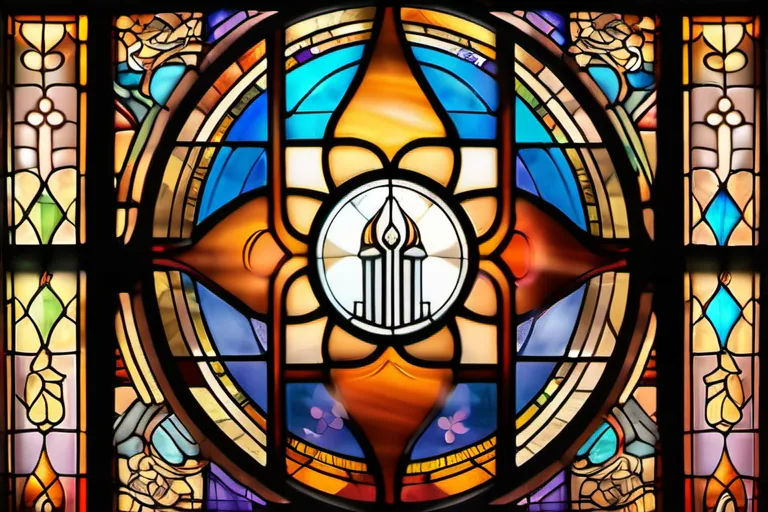Explore the fundamental principles and beliefs that unite monotheistic religions.
In this article, we delve into the key teachings that bind together the major monotheistic religions. From the Abrahamic faiths to Zoroastrianism, we’ll examine the core tenets that define belief in one God.
The Concept of One God
Have you ever pondered the essence of belief in one God? Is it merely a concept that exists on paper, or does it hold a profound significance for millions of people around the world? The idea of believing in one God has been a cornerstone of several major religions and has shaped human civilization in countless ways. Let’s delve into the definition and significance of this concept.
Imagine you are standing at the base of a vast mountain, its peak lost among clouds. This mountain represents the concept of belief in one God. From different perspectives and distances, people view it differently, yet all acknowledge its towering presence. Judaism, Christianity, and Islam share a common thread—the belief in one singular, omnipotent deity. This monotheistic perspective stands as a guiding light through complex religious doctrines.
The origins of this belief can be traced back to ancient times, but the development and refinement have been particularly significant within Abrahamic faiths. In these religions, the concept of one God is deeply intertwined with narratives of creation, revelation, and covenant. The idea that there is only one true God not only unites believers but also provides a moral framework for living life.
Consider the metaphor of a river flowing through different valleys. Just as a river maintains its essence while passing through various terrains, the belief in one God remains constant across Judaism, Christianity, and Islam, despite their distinct practices and customs. This shared belief serves as a unifying force, bringing people together under a common spiritual canopy.
Monotheism in Abrahamic Faiths
Imagine a world where every faith speaks a universal language, sharing the core belief that there exists only one God. In Judaism, Christianity, and Islam—often referred to as the Abrahamic faiths—they not only share this belief but also weave it into the very fabric of their teachings.
One God: The Foundation
In Judaism, the concept of Elohim, or God, is central. It is a singular being who is omnipotent, omniscient, and omnipresent—attributes that resonate deeply in both the Old and New Testaments. When we ask, ‘Who created the heavens and earth?’ the answer lies within these texts, emphasizing the uniqueness of the one true God.
In Christianity, Jesus is seen as the incarnation of God, but the belief remains that there is only one God in three persons: Father, Son, and Holy Spirit. This belief is encapsulated in the Nicene Creed: ‘We believe in one God, the Father Almighty…’ The metaphorical question can be posed: Can a single sun cast multiple shadows if it exists alone?
Islam reinforces this unity with the Shahada, the declaration of faith that begins with ‘There is no god but Allah and Muhammad is his Messenger.’ This statement encapsulates the belief in one God, transcending the complexities of multiplicity. It’s like saying: Can a river exist as more than just water?
Theological Pillars
In these faiths, the belief in one God dictates their moral and ethical codes. The Torah, New Testament, and Koran all outline a set of principles meant to guide believers towards righteousness and virtue. These teachings are often seen as a way to live in harmony with the will of God.
The commandments given by Moses, the Sermon on the Mount preached by Jesus, and the rulings derived from the Quran all serve as guidelines for followers. It’s like navigating a ship: without a clear compass pointing towards one direction, every faith would be lost at sea.
Community and Worship
The shared belief in one God also binds communities together. Synagogues, churches, and mosques become places of communal worship, where the teachings are shared, and the presence of a single deity is felt. It’s like finding common ground amidst diverse landscapes—each place unique yet connected by this singular thread.
Zoroastrianism: The Ancient Monotheistic Faith
Imagine stepping back through time, to a place and era where the concept of monotheism was first kindled. Enter Zoroastrianism, one of the world’s oldest monotheistic faiths, which dates back to ancient Persia over 3,500 years ago. This religion laid down the foundational principles that would later influence other major monotheistic traditions.
At its core, Zoroastrianism centers around the worship of Mazda, also known as Ahura Mazda, the Wise Lord. This deity is often seen as the embodiment of wisdom and light, a powerful entity who created the world in opposition to an evil force called Angra Mainyu or Ahriman. The belief in a struggle between good and evil is a profound concept that has resonated throughout various cultures and religious traditions.
Zoroastrianism also introduced the idea of Free Will, allowing individuals to choose their path, either by following Mazda’s teachings or succumbing to Ahriman’s temptations. This notion of personal choice in moral decisions is a significant departure from other religions that may preordain human destiny.
The religion emphasizes righteousness and ethical living as means to achieve spiritual purification and ultimately reach Armaiti, the eternal abode of the righteous. Practices such as the use of fire as a symbol of purity and wisdom, along with daily rituals like prayer and recitation of holy texts, are integral parts of Zoroastrian worship.
As we delve into the history of Zoroastrianism, one wonders how its teachings on freedom, justice, and moral choice continue to inspire those seeking a spiritual path that emphasizes individual responsibility. Could it be that these ancient teachings hold keys to modern ethical dilemmas and personal growth?
Considering Zoroastrianism’s profound impact, it’s not hard to see why understanding this faith is crucial for comprehending the broader tapestry of monotheistic beliefs. Its principles on justice, moral integrity, and the struggle against evil continue to echo in contemporary society, making it a fascinating subject for exploration.
The Role of Prophets in Monotheism
The role of prophets in monotheistic religions cannot be overstated; they are often seen as the conduits through which divine messages flow into the world, shaping beliefs and guiding souls towards a higher understanding. Think of them as rivers, carrying the pure water of divine wisdom from its source to parched lands in need. In Islam, Judaism, and Christianity, prophets are not just messengers; they are essential figures who play a pivotal role in establishing and reinforcing the belief in one God.
Why do these prophets hold such significant positions? Consider Moses, whose life story is told across multiple monotheistic traditions. He was chosen to lead his people out of slavery, not just as a liberator but as a guide towards understanding their relationship with the One True God. His encounter on Mount Sinai, where he received the Ten Commandments, is a pivotal moment in the history of religious teachings.
But why are prophets important beyond their historical significance? They serve as examples for believers, demonstrating how to live a life aligned with divine will. In Christianity, Jesus is seen as the ultimate prophet, bringing new insights and strengthening the monotheistic message through his teachings and miracles. He challenges his followers to not only believe in God but also to practice love, forgiveness, and compassion.
In Judaism, figures like Elijah stand out for their bravery and unwavering commitment to truth, often standing up against societal norms that deviate from divine guidance. These prophets remind us of the importance of individual responsibility and the impact one can have when aligned with a higher purpose.
Each prophet in these traditions is like a lighthouse, guiding ships through treacherous waters towards the safe harbor of righteousness. Their stories are intertwined with the broader narratives of their faiths, making them integral to the fabric of monotheistic belief and practice. Understanding their roles can help us grasp the depth and complexity of these beliefs, and perhaps inspire us to seek our own paths towards enlightenment.
Monotheism and Morality
Can we truly understand the essence of morality without diving deep into the core teachings of belief in one God? In monotheistic religions, the concept of justice, mercy, and righteousness forms the backbone of ethical living. Imagine these virtues as the pillars holding up a grand temple—each one is essential for its stability.
Justice, often symbolized by scales, represents fairness and equality before the divine eye. How do we ensure that our actions align with this divine standard? Is it not like trying to find balance in life, where every decision we make tips the scale either towards righteousness or sin?
Mercy, on the other hand, is the gentle breeze that soothes troubled souls. It reminds us that even when we falter, there is always a chance for redemption and forgiveness. How do these teachings influence our treatment of others? Do they inspire us to be more compassionate in our dealings with one another?
Righteousness, the guiding light that illuminates the path of virtue, calls on us to live according to God’s will. It is about making choices that honor His presence in our lives. How do we measure our righteousness? Is it through good deeds or adherence to religious laws alone?
The intertwining of these teachings forms a tapestry of moral guidance. Just as each thread strengthens the fabric, so too does each teaching contribute to a robust ethical framework. By embracing justice, mercy, and righteousness, believers strive not just to follow rules but to live out a life that honors the divine.
Reflecting on these teachings, we realize that the path of monotheism is not merely about obeying commandments but also about cultivating a heart that resonates with the divine principles of justice, mercy, and righteousness. It is in this journey that we find true meaning and purpose.
Interfaith Dialogue: Bridging Divides
Can we truly understand monotheism without exploring how different faiths see their divine creator? The belief in one God has shaped civilizations and cultures for millennia, yet despite this shared foundation, significant differences often lead to misunderstandings and conflicts among believers. How can interfaith dialogue serve as a bridge between these beliefs?
Imagine walking on a vast plain where each path represents a different religion. You find yourself on the Judaic, Christian, or Islamic path, but every so often, you see footprints that resemble those of your neighbors. These footprints are evidence of shared beliefs—belief in one God who is just and merciful, a belief in prophets who spoke His word, and a commitment to righteousness. Interfaith dialogue allows us to step closer to each other, to acknowledge the similarities and learn from the differences.
Through these dialogues, we can uncover the deep wells of wisdom that lie beneath our beliefs. For instance, the concept of justice is central in all three faiths. In Judaism, God’s justice is seen as a balance; in Christianity, it’s about redemption and forgiveness; and in Islam, it involves both personal accountability and social responsibility. By delving into these teachings, we can find common ground that strengthens our communities.
Moreover, interfaith dialogue fosters an environment where we can challenge our assumptions and deepen our understanding of the divine will. It’s like a light being shone on dark corners of our beliefs, revealing truths that we might have overlooked. This light helps us to see each other as fellow seekers of truth rather than as threats or competitors.
In conclusion, interfaith dialogue is not just about understanding different religions; it’s about building a world where tolerance and respect flourish. By engaging in these dialogues, we can pave the way for a more harmonious and compassionate society, one step at a time, along our shared paths towards truth.
Conclusion
 By understanding these shared principles, we can foster greater interfaith dialogue and appreciation for the rich tapestry of monotheistic beliefs.
By understanding these shared principles, we can foster greater interfaith dialogue and appreciation for the rich tapestry of monotheistic beliefs.











